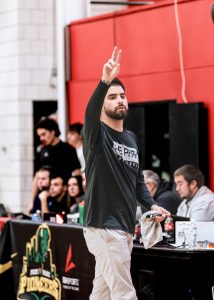Quarantine spaces on campus
November 11, 2020
Colleges and universities around the country have put different COVID-19 procedures in place so that students could return to campus this semester. Point Park has quarantine/isolation rooms for students to use in different situations, but some are unaware of how they work.
Dean of Student Life Michael Gieseke, who oversees the process, explained how the rooms work and what to do to get there.
“We have rooms reserved on the 19th and 20th floor [of Lawrence Hall],” he said. “Those rooms are used if a student doesn’t have a place on campus that they occupy by themselves where they can stay self-contained.”
If a student is in Thayer Hall and has a suite or has roommates, they are able to use these rooms. The rooms are available to on-campus students only. If a student has a single room with their own restroom or their living situation permits a suitable quarantine, they do not have to use the 19th and 20th floor rooms.
There are multiple ways students can go about using the rooms, Gieseke explained. The first would be to reach out to the Health Center and explain the symptoms they have, and they will conduct a virtual screening to see if a student needs tested.
“From the moment we decide they need to be tested to the moment they get their results, they are quarantined,” Gieseke said.
Another way is if a student went and got their own test and it either came back positive or they are awaiting results, they could reach out to the Health Center and they would discuss how they would quarantine.
The third way is if a student has had close contact with someone who had a positive case, in which they will need to quarantine for 14 days.
“Close contacts are students who had contact with a positive case while they were contagious,” Gieseke said. “Even if a close contact student is considered asymptomatic, meaning they do not show any symptoms, they still need to quarantine for 14 days.”
Once it is decided that a student will need to use an isolation space, Gieseke reaches out to them and walks them through what they will need to do, things they can bring with them and more. Students generally bring enough stuff for about two to three days, but it really depends on the case. If a student is a close contact, they will need to prepare for a full 14 days.
“They can bring anything they want,” he said. “The rooms come as they are and have a shower curtain and toilet paper, but everything else they have to bring, like clothes, toiletries and electronics.”
Gieseke added that as time has gone on, they realized that some students, such as ones who live in Thayer, may not have soap as it is provided to them in the communal restrooms, so they provide bar soap for those who may not have it.
For meals, students can download CulinArt’s app, Nutrislice, and order food from the daily menus to be brought to their door.
“Whatever they order is brought to their room, and we knock on their door to inform them that their food is there,” Gieseke said.
Throughout their quarantine, the Health Center and Gieseke are in contact with the students so that they know they are not alone, and so they can reach them if they have any questions or concerns.
“The nurse’s office checks in every two days, and most of them get a phone call from me,” he said. “They have my number if they have any questions, and they know they are supported if anything comes up.”
Once it is nearing the end of a student’s quarantine, the Health Center reaches out to the student to check and make sure they do not have any symptoms. This happens the day before the quarantine is supposed to end. If a student does not have any symptoms and feels okay, the center lets them know they are able to leave the next morning. If a student does have symptoms, they may have to stay in the space a little longer until they are symptom-free, depending on what the symptoms are.
Kara O’Rourke, a freshman environmental science major, used a quarantine room recently.
O’Rourke said that the experience was very lonely and describes the experience as being rough mentally.
“Having to move out of your normal living space and into an unknown secluded space is difficult,” she said. “With that, you are constantly monitoring your own health and somewhat scared of what could happen if you do become ill.”
O’Rourke was also stressed academically and said some professors had a lack of understanding when it came to the situation. She feels that more resources could be provided to students in this aspect.
“My major complaint would just be when food wasn’t delivered to the room, and the food options were limited on certain days because of the dining halls lack of options,” she said.
She did think the rooming situation was effective in isolating, as she had the whole floor to herself and was able to safely quarantine.
Makahla Wiler, a senior broadcast reporting major, also used one of the quarantine rooms this semester. Wiler tested positive for the virus and said the experience of having to be quarantined sucked, as she is a very active person.
“The experience itself of having COVID-19 sucks,” Wiler said. “Your body hurts, you don’t feel well, and it’s not an experience I would put anyone through. But the reality of what sucked the most was how it felt like your humanity and your way of life was taken away from you in a lot of senses.”
Wiler, as a social person, also describes the quarantine experience as being mentally draining. She did expect to get COVID-19 at some point, since she has a weak immune system.
“You can’t control the universe around you,” she said. “You can’t control what happens, but you can control the mindset you allow yourself to be in to get through the situation.”
Wiler was still in contact (remotely) with people who continuously checked up on her, which she was grateful for. She is appreciative of Dean Gieseke, Dean Paylo, the Health Center and professors of hers that checked up on her and were understanding of the situation.
Although the whole situation was not the best, Wiler understands why it had to happen.
“As much as I hated living in that small tiny room, I understand the process the university has to take in the protocols to keep everyone safe,” she said. “I think it’s smart separating people from the rest of the university. As much as it is mentally draining on the individual, it comes down to the end result and what’s going to work better for the majority, and if that’s me being in a room by myself for 11 days to protect hundreds of other people from becoming sick or potentially shutting down the university, I’ll do it.”
Gieseke acknowledges that they have learned along the way what is more effective.
“There’s nothing ideal about this situation, and I wish it could be different,” he said. “One of the things I have to remind myself is that I’ve been doing this for 20 years, and this is the first time I’ve had to do something like this. There was definitely a little bit of a learning curve with how the rooms should be set up, but I think we’ve learned from where we started to where we are now, and I’d say it’s a fine-tuned system.”



















